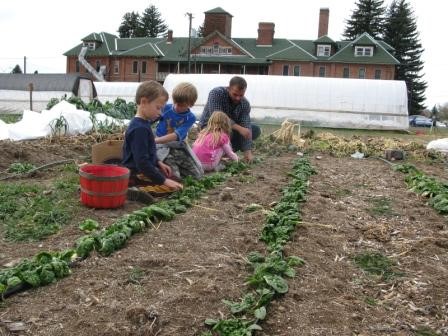by Tristen Payne
“So, how many of you have heard of NCAT and or ATTRA?”
Nearly half of the Big Butte Kiwanis Club’s hands slowly rose. Seeing a general awareness of NCAT was wonderful, but as the presentation developed, it was quite obvious that these individuals still lacked knowledge of what our organization actually does. ATTRA is an NCAT program whose purpose is to provide technical assistance and high-value information to agricultural entities. The lack of awareness of NCAT and ATTRA, the Appropriate Technology Transfer to Rural Areas, appears to be a common theme from the limited interactions I have had with Butte’s community.
My position as the Farm Energy Educator Energy Corps member has involved a lot of front-end research and meant that I haven’t gotten to interact with the majority of the Butte community yet. The parts of the community I have interacted with so far have already sought out the SIFT Farm (one of the many projects of ATTRA) for help. If a majority of the Butte community is lacking familiarity with ATTRA they cannot receive the help that ATTRA could provide, namely education on how to grow plants and crops in this area and use energy more efficiently in those contexts. Fixing this information gap is imperative. All of the NCAT staff involved with ATTRA want to help improve our community’s health, safety, and welfare through self-sustaining agriculture. In order to do this, we need individuals to seek out our research and publications, or for us to bring the results to them. And that’s where I come in.
The Big Butte Kiwanis Club was not exempt from the information gap. It took a brief overview of current Energy Corps projects and the Kiwanis Club began raising their curiosities. My personal favorite question concerned the efficiencies of different solar pump systems. While the question was quite detailed and required a long conversation to answer the entirety of the issue, I was ecstatic to see how quickly the club was willing to pursue technical questions. These were the reactions and questions I want to see ATTRA continue to receive from the wider community. If ATTRA can continue to cultivate an audience, our research will reach a larger population, and bring perspective, questions and ideas that we may have overlooked. If our goal is to motivate sustainable agriculture in the United States, we have quite a few people to reach.
Being able to interact with another community-oriented group was energizing. The Big Butte Kiwanis were apt to understand how NCAT has been developing sustainable solutions in Montana. Not only were they quick to perceive the scope of NCAT, but with their long-standing community service history ATTRA could learn from and boost the Kiwanis Club’s developments. Through proactive individuals like the Kiwanis club, I hope to be able to integrate and spread ATTRA’s technical capabilities to build a stronger, more resilient, Montana.
__________________________________________________________________________________________
Tristen Payne holds a bachelor’s degree in Environmental Economics and a minor in Energy Policy from Western Washington University. Prior to Energy Corps, Tristen was employed by the Army Corps of Engineers and also worked in healthcare at Adventist Health and Kroger. Tristen joined Energy Corps in October 2017 and will serve at the National Center for Appropriate Technology in Butte as a Farm Energy Educator. He will develop farm energy education materials, conduct energy audits, research efficiency improvements, and work on public outreach.










